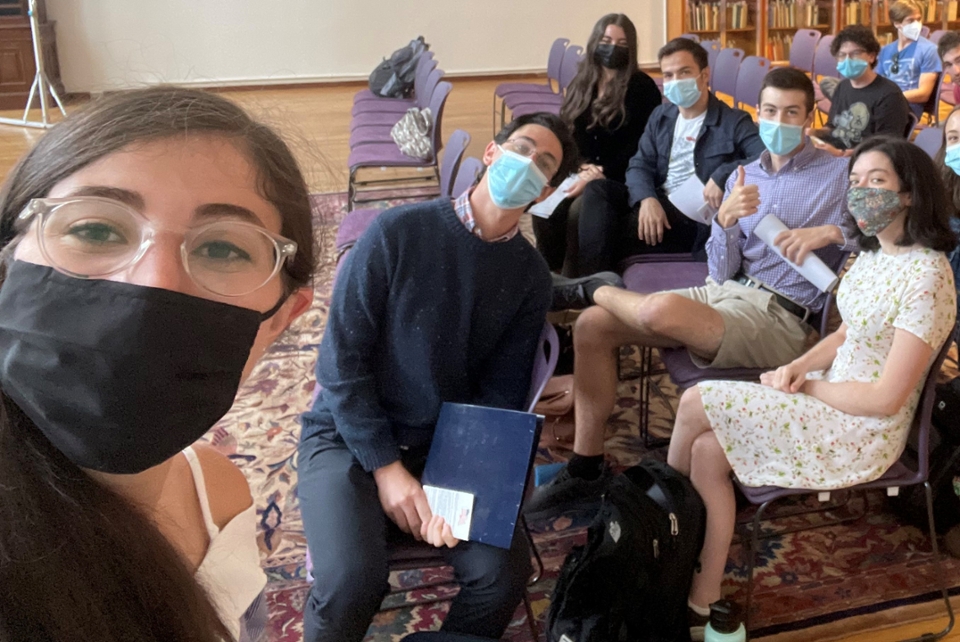Students and faculty give the U.S. Constitution a close read
As part of "Just Read It!" organized through the History of Ideas program, all first-year students at Brandeis received their own copy of the U.S. Constitution
 Courtesy of Renee Nakkab
Courtesy of Renee NakkabRenee Nakkab ‘22 takes a group selfie with other students who participated in "Just Read It!" a student, faculty and staff discussion of the U.S. Constitution.
So when History professor David Katz, Director of the History of Ideas Program, asked her to come back to campus to speak about the founding document on a September afternoon at “‘Just Read It!’: A Dialogue With Students About the United States Constitution,” it seemed like a good opportunity to finally get through it.
“I’m proud to say that under pressure of having to give a speech about it, I finally got around to reading the whole thing,” said Fearon, an aspiring writer. “The actual constitution is like a contract that you draw up with new roommates such as how often we will take the garbage out and how we divide up fridge space. Maybe there are two Constitutions—the real constitution, which is a document concerned with the nitty gritty logistics of setting up a representative democracy… [and] the constitution that exists in our collective imaginations as a sort of religious object of worship.”
Fearon’s comments were exactly what Katz was looking for when he organized the “‘Just Read It!’: A conference on the US Constitution.” As Director of the History of Ideas Program, Katz wants students to read more original sources and formulate their own opinions, rather than relying on what other people said.
“All sides in the current political landscape claim that this or that is either unconstitutional or guaranteed by the Constitution,” Professor Katz said. “We need to read and understand the document in depth, in context, historically and legally, so see if any of those claims are justified.”
To motivate students, he sent a copy of the Constitution to every incoming Brandeis undergraduate this year. Each copy was adorned with a ‘Just Read It!’ sticker with the student’s name on it. Then, in September, he invited a few experts on the issue — David M. Fryson, interim chief diversity officer and vice president for the Office of Diversity, Equity and Inclusion at Brandeis; Michael Willrich, Leff Families Professor of History at Brandeis; Eva Bellin, the Myra and Robert Kraft Professor of Arab Politics at Brandeis; and Boston College Political Science Professor Ken Kersch, as well as a number of History of Ideas students, to share their favorite parts of the constitution. As the faculty members cited various clauses, the student speakers hunched over their Constitutions to prepare their responses.
Joey Kornman '23, a junior from West Hartford, Connecticut, majoring in Classical Studies and Economics, with minors in Politics and the History of Ideas, said that rereading the constitution helped him realize how “the inability to get anything done” in Washington “is a design feature, not a bug,” of the Constitution. He was reminded of the “I’m just a bill" song from the famous Schoolhouse Rock cartoon that watched as a child, in which a young boy learns that the process of making a new law isn’t easy.
Renee Nakkab ‘22, a senior from Long Island majoring in English, History, and Creative Writing and minoring in Legal Studies, Islamic Middle Eastern Studies and History of Ideas, who also first learned about the Constitution from Schoolhouse Rock — listening to the preamble song as her family drove each year from Long Island to Florida — was surprised that the preamble isn’t discussed more throughout history. Through research, she found that in the 1905 case Jacobson vs. Massachusetts, the Supreme Court ruled that the preamble didn't contain any powers.
Elijah Herenstein ‘23, a junior majoring in Philosophy and English, with a History of Ideas minor, said that in rereading the constitution, he “found himself captivated and vexed” by the 14th Amendment, Section 2, which he called “an incredibly messy and poorly punctuated piece of writing.” He said he was drawn to it because it is so tragic — though states are told that they will lose votes for disenfranchising otherwise eligible voters, not once has this happened. “That’s the point about powerful tools,” he said. “They’re only powerful if we’re willing to use them.”
And Can Kazan ‘22, an international student from Turkey, who read the Constitution for the first time this summer, was surprised that it was such “an easy read.” He was also glad to see that the founders provided stipulations for additional amendments through the Fifth Amendment, which he believed “shows the revolutionary mindset of the framers,” as they knew that societal change would be necessary.
Fryson, an attorney, preacher, and civil rights activist, said he hoped that the conference made the Constitution feel more “alive” for students. He shared the ways in which the Supreme Court has interpreted the constitution in different ways during this family’s trajectory, from his great-grandfather, born in 1843 and therefore considered chattel or 3/5 for taxation, to his father, born in 1896, the year that the Supreme decided on Plessey v. Ferguson, to himself, born in 1954, the year that the Supreme Court overruled segregation in Brown v Board of Education, to his son, born in 1978, the year that quotas were outlawed in Balke v. California.
“My emphasis was on making the Constitution come alive by tying its provisions to events or, more importantly, the events of all of our lives,” he said after the conference. “Although it was not mentioned in the Constitution, slavery was the shadow that darkened the Constitution’s use as a freedom document. My point was that the Constitution and constitutional analysis is not just a problem on paper, but relates to rights and privileges.”
Categories: Alumni, Humanities and Social Sciences





